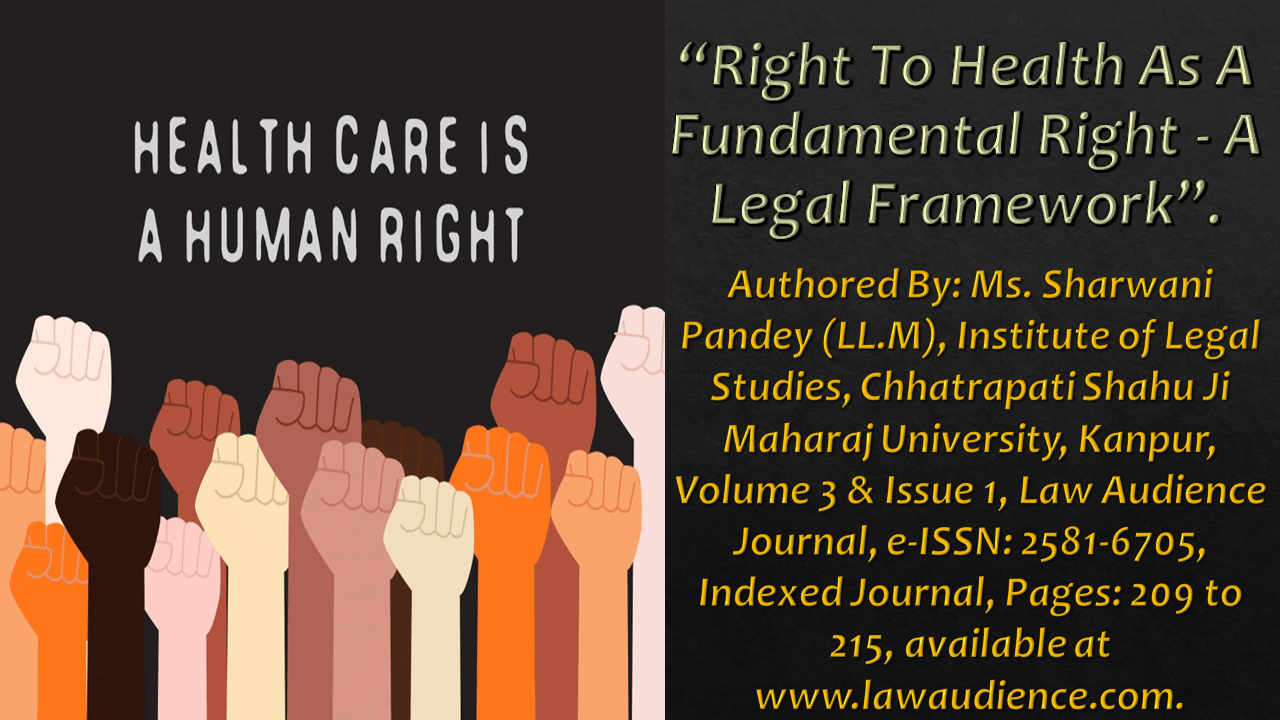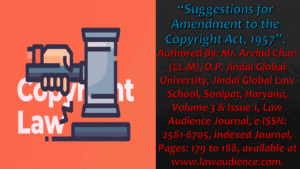Click here to download the full paper (PDF)
Authored By: Ms. Sharwani Pandey (LL.M), Institute of Legal Studies, Chhatrapati Shahu Ji Maharaj University, Kanpur,
Click here for Copyright Policy.
ABSTRACT:
“Healthy mind is the healthy body this statement not only gives the definition but is a positive assertion that without physical strength mind is also not healthy. The enjoyment of health at the highest standard is not the only requirement at the national level but also on the international level. It is almost a decade that country is suffering from the pandemic, people health is deteriorating day by day, and this was not the first time that nation has usually seen but in 1980 also a high epidemic had touch the large scale due to which many people died. The main reason behind this contingency is poor health care and lack of medical services in the nation. This pandemic not only affects people on a large scale but also on socio-economic factor and forced people to meet challenges. This study speaks to make a robust framework on Health. The study investigates on constitutional approach towards health and various judicial pronouncements on it and some suggestion while making policy. This study is based on doctrinal research”.
Keywords: Pandemic; COVID; Fundamental Rights; Universal Declaration of Human Rights; Health Policy, International Covenant on Economic, Socio and Cultural Rights; GDP.
I. INTRODUCTION:
In Vincent vs. Union of India[1], held that a healthy body is the essential and basic foundation for human activities. Health plays pivotal part in overall development of human being, which is vital for socio-economic development of the nation. As country is facing with a severe problem of covid-19 from a long time has now witness itself the vulnerability of India healthcare system. Much of this blamed on India’s low expenditure on public health-1.29% of the GDP (2019-20)[2]. India is a member of U.N. has ratified the convention to protect the health of each individual. However, the quality of health has not given to entire public country faced this epidemic. Our Indian constitution also not expressly mention about Right to Health however, Article 21 not talks about right to life and personal liberty but it has a wider connotation. This article embraces the whole human existence like right to clean environment, right to life with dignity not mere survival, better standard of life and so on. Right to health indirectly mentioned in Article 21, this has to read with many of the provisions of Indian constitution. This is a time where country can give a status to right to health, which guarantees a fundamental right with proper principle of transparency.
II. DEFINITION OF HEALTH:
As in general, sense health as per oxford dictionary means “the state of being free from illness and injury[3]”. According to WHO[4], Health is a state of complete physical, mental and social well-being and not merely the absence of disease[5]. This definition covers the whole scenario of public health care that each individual be physically fit and being sound and absence of any disease not only at the national level but also at the international level.
II.I CONSTITUTIONAL DIMENSION AND HEALTH:
Indian Constitution embodies the principle of the welfare state and socio-economic right but somewhere it lacks positive assertion as right to health is not incorporated in a legal framework however, it can be viewed in Article 21 of Indian constitution indirect manner. Moreover, there are several grounds in Indian constitution, which introduce the role of state to maintain the health of citizen in its attainable growth. Part IV of Indian constitution which is the Directive Principles of State Policy (DPSP) which is based on three tier principles i.e., socialist, gandhian and western liberal principle impose a duty on state to secure the condition of health of its public. In a socialist principles Article 38 which imposes a directive on state to secure a social order for the promotion of welfare of the people and Article 39(e) talks on workers to protect their health. In Gandhian principles Article 47 on states to raise the level of nutrition and the standard of living of its people as primary responsibility.
Moreover, state in particular directs its policy towards secure the health of the worker. However, this duty is not only upon the state but also on the village Panchayat and Municipalities to maintain the health of public. Article 243G talks the same. It states “The legislature of a state may endow the panchayat with necessary power and authority in relation to matters listed in the eleventh schedule.”
This schedule directly talks about Health like;
- Drinking;
- Health and sanitation, including hospitals, primary health center;
- Water supply for domestic and commercial purpose etc.
III. JUDICIAL PRONOUNCEMENTS FOR RIGHT TO HEALTH:
Indian judiciary plays a proactive role in every matter through public interest litigation. Courts of India play a very crucial role in term of fundamental rights especially for poor, downtrodden people. Many years ago, Indian judiciary enlarge the ambit of Article 21 of Indian constitution. Now Article 21 that not only conferred to Right to life but also extend its feathers by including Right to food, right to clean environment and so on. In the same way, our judiciary also response towards health of its public by including Right to health as fundamental right in case of Bandhua Mukti Morcha vs. Union of India[6], in this case court interpreted the right to health under article 21 which guarantee the right to life.
In case of Paschim Bangal Khet Mazdoor Samity & Others vs. State of West Bengal and Others[7], in this case court held in a very humble way that being a welfare state, it is the primary responsibility of government to provide medical facility. Preserving a life of people is paramount importance. In the case of State of Punjab & others vs. Mohinder Singh Chawla[8], the judiciary confirmed right to health is fundamental right and government has a responsibility to provide medical services. In State of Punjab & Ors vs. Ram Lubhaya Bagga[9], the court went on endorse the state responsibility to maintain health services[10]. Thus, it is responsibility of state to protect and vigour and right to health, is a fundamental right read with Article 39(e) 41,43,47[11].
IV. WHY UNIVERSAL HEALTHCARE POLICY?
Health is not only a national matter but also a matter of international regime. The right to achieve the highest standard of health recognizes under international law. The right to health firstly articulated by WHO that “the enjoyment of the highest attainable standard of health is one of the fundamental rights of every human being”[12].
In 1948 Universal Declaration of Human Rights also recognized health as the standard of living as per Article 25. This concept was again recognized in 1966 in the International Covenant of Economic, Social and Cultural Rights in Article 12 which state that everyone has a right to enjoy the highest attainable standard of physical and mental health.
IV.I IS THIS RIGHT TIME TO MAKE A STANDARD ON HEALTH:
By seeing the present situation of COVID-19 despite the fact the public health services, doctors, staff all are facing the contingent situation to meet the challenge of this epidemic a completely different situation there is need to make a robust healthcare policy. A robust policy is required when country facing major problem of public health and economic crisis due to covid-19[13]. In September 2019 a High-level group constituted under 15th Finance commission had recommended that right to health be declared as a Fundamental right[14].
However, doing this the problem arose about the subject matter, as Health is a state subject that falls in the state list of seventh schedule of Indian constitution. In 2019 NITI Aayog also embarked upon unequal public health because the state is depending on centre for fiscal this would lead sometimes to bureaucracy. If Constitutional maker shift this duty towards central, what will be the effect? If this happens, money will make but can it benefit for Indian cooperative federalism but much is not likely seen in present situation. Much more cooperation is need between not only state and central but also in between local and district level so it would not lead to over centralization. The recommendation to declare the right to health a Fundamental right, if implemented, will strengthen people’s access[15].
A People perception is now totally changed towards COVID and reforms pertaining to this epidemic will change through political flow till government responds. However, this is not the first time that we need to take some robust rule but many instances have come across by which people mostly affected. In 1980, HIV epidemic has raged and thousands of people killed and there was no effective treatment, there was little hope for those diagnosed with HIV, facing debilitating illness and certain death within years, said by Dr. Gottfried Hirnschall, Director at WHO[16]. In the same way country is facing the problem. Several people are dead due to non-availability of medical health care services this is due to fractured health care system for poor, middle class, and rich person. These three should be in one framework for all the classes so that government could regulate for both private and public hospitals. National health policy had proposed in 2017 for 2.5% of GDP for public healthcare system but it is now reduced due to which public not only for private hospital but also for public hospitals pays a high amount. Presently, People are pushed out of the hospital as no proper care. Prime Minister Health Insurance Scheme is been such a failure as it is high charging the patients that normally done in private sector.
So, in this sense, even the ‘worst public health states’ have stood by the people[17]. Right to education which has given a standard framework under Right of children to free and Compulsory Education Act, 2009, likewise a uniform standard has to be given to right to health as this can lead to more transparency and proportionality in medical sector.
V. CONCLUSION:
There is a risk of covid and pandemic more if proper care and precaution not taken and it is due to the growing population, unhygienic places etc. In this article, we observe that Health is a very crucial part of everyone. If people do not attend can lead to destruction and crisis in the nation. This pandemic has open the eyes of all that addressing right to health as fundamental is not a sufficient quote but a need to some activities on this. There has to take some measure for a robust health care system. Not only nation have to work on this framework but also international too. This pandemic has taught the lesson and human right community play a crucial role in this situation to enact some standard to protect the life of people.
VI. SUGGESTIONS:
- A strong policy has to be made on the health care system that can be supported by all.
- Accurate data has to be ensuring without fake among people regarding the number of cases.
- There must be policies that can be accessed by everyone without discriminating their caste or class.
- The country has to be ready for emergency or contingency with proper facilities.
- There need to be fund allocated for health service system, which can meet the challenges during pandemic.
- Medicine has to distribute at market price without smuggling of it and make a policy firm punishment for those who go against it.
- Public and private hospitals should cap on their prices for providing facility to individuals.
- The country has to ensure at its state level that medical practitioner has sufficient resource to work.
- In a pandemic, many practitioners refused to attain the patient who is suffering from other diseases. There needed to look upon this matter that other patient also covers under this policy.
Footnotes:
[1] AIR 1987 SC 990.
[2] Nishant sirohi, Declare the right to health a fundamental right,14 july2020 available at http://www.orfonline.org/expert-speak/declaring-the-right-to-health-a-fundamental-right/(last visited on 11June 2021.
[3] Harald Brussow, what is health available at http://www.ncbi.nlm.nih.gov/pmc/articles/PMC3917469/.
[4] World Health Organization constituted on 7 April 1948.
[5] Preamble of the constitution of the WHO as adopted by the international health conference (official record of the WHO, no.2, P.100).
[6] AIR 1984 SCR (2) 67.
[7] AIR 1996 SC 2426.
[8] AIR (1996)113 PLR 499.
[9] AIR 1988 SC 117.
[10] Nishant sirohi, Declare the right to health a fundamental right,14 july2020 available at http://www.orfonline.org/expert-speak/declaring-the-right-to-health-a-fundamental-right/(Last visited on 11 June 2021).
[11] In consumer education & research centre &others v. Union of India AIR 1995 SC 42.
[12] WHO constitution (1946).
[13] Amend the article 21 of constitution to make health a fundamental right available at http://m.timesofindia.com/city/chennai/amend-article-21-of-constitution-to-make-health-a-fundamental-right-villupuram-mp/amp_articleshow/83147575.cms.
[14] Nishant sirohi, Declare the right to health a fundamental right,14 july2020 available at http://www.orfonline.org/expert-speak/declaring-the-right-to-health-a-fundamental-right/(last visited on 11 June 2021).
[15] Ibid.
[16] This is how far we’ve come since the last day world Aids Day available at http://www.globalcitizen.org/en/content/world-aids-day-2019/(last visited on 12 June 2021).
[17] Should healthcare be a fundamental right available at http://www.thehindu.com/opinion /op-ed/should-healthcare-be-a-fundamental-right/article31528818 (last visited on 11 June 2021).
Cite this article as:
Ms. Sharwani Pandey, Right To Health As A Fundamental Right – A Legal Framework, Vol.3 & Issue 1, Law Audience Journal, Pages 209 to 215 (24th June 2021), available at https://www.lawaudience.com/right-to-health-as-a-fundamental-right-a-legal-framework/.



